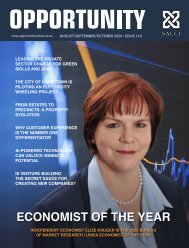Blue Chip Journal - June 2019 edition
Create successful ePaper yourself
Turn your PDF publications into a flip-book with our unique Google optimized e-Paper software.
BOUTIQUES<br />
Facing the boutique fear<br />
Building a sense of community is key<br />
If you hang around boutique asset<br />
managers long enough, you’re bound<br />
to hear them bemoan a lack of growth<br />
in their assets under management<br />
given the returns they’ve generated. It<br />
is a legitimate gripe. Most left an institutional<br />
background to implement their<br />
respective investment philosophies with<br />
autonomy. There was risk involved in<br />
such a move. Jump forward a few years<br />
and many of these fund managers have<br />
very appealing track records. But many<br />
remain frustrated that their hard-won<br />
returns haven’t resulted in a commensurate<br />
growth of their entrepreneurial<br />
endeavours.<br />
Why are good track records going unrewarded?<br />
An understanding of the psychological<br />
barriers walling off investors from<br />
our respective boutique propositions is a<br />
good place to start.<br />
Don’t make me look bad<br />
As we go through life, we choose to<br />
associate ourselves with certain people,<br />
places and brands. We do this because<br />
of an innate desire to belong, to feel that<br />
we’re part of something bigger. Who, or<br />
what, we chose to associate ourselves with<br />
depends on how we resonate with that<br />
entity, and importantly, how that association<br />
reflects on us.<br />
Investors are no different. Whether<br />
you’re a discretionary fund manager, a<br />
multi-manager, a financial advisor, or the<br />
end investor, you want to partner with an<br />
asset manager that, for whatever reason,<br />
you feel proud to be associated with.<br />
Whether you’re having your nails done,<br />
or sitting around a braai with friends,<br />
you want to be able to broadcast who is<br />
managing your money. Most will do this<br />
only because they know a community<br />
exists that feels the same way.<br />
The challenge facing most boutique<br />
asset managers is that their brands are<br />
not strong enough to provide that feeling<br />
of community. Because of this, investors<br />
considering boutiques must accept that if<br />
something goes wrong (say poor returns),<br />
they will not have that safety net that<br />
community provides. Without that support,<br />
their decision will be less forgiveable (for<br />
both themselves and others), and, in very<br />
simple terms, make them look bad.<br />
Why this is one fear you must face<br />
Diversification: Whether small managers<br />
perform better than bigger managers is a<br />
moot point. What is important is that larger<br />
managers are likely to correlate to each<br />
other for the simple fact that they share<br />
a similar investment universe. It therefore<br />
makes little sense to blend larger players in<br />
the name of diversification. Find the boutique<br />
managers that produce uncorrelated<br />
return streams and work those into your<br />
portfolios to realise the benefits of true<br />
diversification.<br />
Differentiation: This element is specific to<br />
the intermediaries building investment<br />
solutions for investors. We are all acutely<br />
aware of the increasing transparency in<br />
our industry. The somewhat uncomfortable<br />
truth is that greater clarity around how<br />
investments are managed will finger those<br />
in the value chain not adding, well, value.<br />
It’s critical for the sustainability of all stakeholders,<br />
including boutiques themselves,<br />
to be able to differentiate themselves from<br />
their competition. Boutiques still offer<br />
intermediaries this opportunity.<br />
Development: If we read the same books,<br />
listen to the same people and visit the same<br />
places, we forgo the opportunity to learn<br />
and become better humans and better<br />
decision-makers. Boutique managers, like<br />
their bigger counterparts, have their own<br />
set of unique beliefs and views. Absorbing<br />
these could provide fresh insight to help<br />
you solve old problems.<br />
Getting over the boutique fear<br />
Rather than shouldering all the risk yourself,<br />
introduce an interesting boutique to your<br />
community of end investors before making<br />
an investment. You’ll find that most smaller<br />
fund managers are very open to such<br />
requests. And instead of a dry PowerPoint<br />
presentation on their philosophy, rather<br />
choose a setting where relationships can<br />
form because people trust people not slides.<br />
Then monitor them. Ask how they are<br />
positioned and track their performance<br />
to see whether they do what they say<br />
they’re doing. Check that they have their<br />
own money invested in the funds they are<br />
asking you to invest in. And then, once<br />
you and your community are comfortable,<br />
start small, increasing your investment with<br />
them as your comfort grows.<br />
Warren Kelly, Business Development,<br />
Obsidian Capital<br />
32 www.bluechipjournal.co.za


















